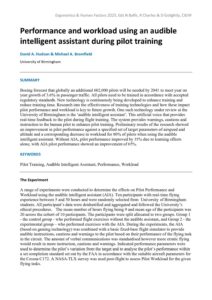| Document | Author David A. Hudson & Michael A. Bromfield |
| Abstract Boeing forecast that globally an additional 602,000 pilots will be needed by 2041 to meet year on year growth of 3.6% in passenger traffic. All pilots need to be trained in accordance with accepted regulatory standards. New technology is continuously being developed to enhance training and reduce training time. Research into the effectiveness of training technologies and how these impact pilot performance and workload is key to future growth. One such technology under review at the University of Birmingham is the ‘audible intelligent assistant’. This artificial voice that provides real-time feedback to the pilot during flight training. The system provides warnings, cautions and instruction to the human pilot to enhance pilot training. Preliminary results of the research showed an improvement in pilot performance against a specified set of target parameters of airspeed and altitude and a corresponding decrease in workload for 80% of pilots when using the audible intelligent assistant. Without AIA, pilot performance improved by 35% due to learning effects alone, with AIA pilot performance showed an improvement of 65%. |

